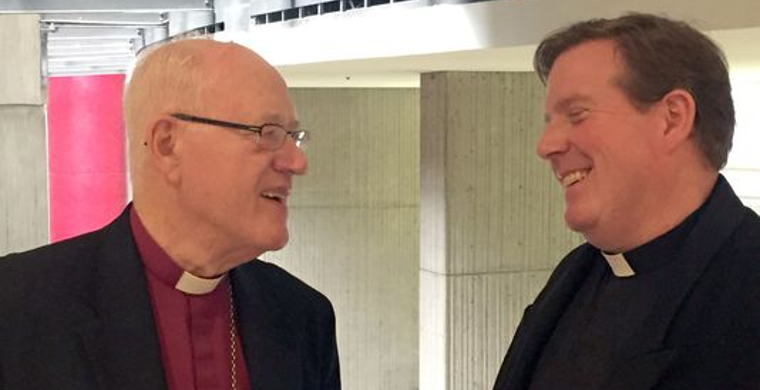Protestant leader: Christianity vital for democracy, rights -- Carey
By Niraj Warikoo,
Detroit Free Press
http://www.freep.com/story/news
May 14, 2015
Visiting Detroit, a former head of the biggest Protestant group in the world, the Anglican Communion, says that human rights and democracy comes out of Christianity
"Christianity is integral to our democracy," said a former head of the Anglican Communion while visiting Detroit.
One of the world's most prominent Protestant leaders is in Detroit this week, preaching that Christianity is vital for democracy, human rights and fulfilling the human soul. But in order for the Christian faith to survive in the West, it needs to reach out and help society or face continued decline, he said.
Lord George Carey, a former Archbishop of Canterbury, was once the nominal head of about 80 million Anglicans worldwide, the third-largest Christian group after the Catholic Church and the Eastern Orthodox Church. Known for his conservative views, Lord Carey on Wednesday delivered the opening prayer to the state Senate in the Capitol and will speak this weekend at St. John's Episcopal Church in Detroit, the house of worship near Comerica Park that is hosting him.
Speaking to the Free Press, Carey called for Christian churches to be more responsive to the needs of communities to remain relevant. His visit comes the same week that a major new report by Pew Research Center was released, showing that the number of Americans identifying as Christian dropped eight percentage points, from 78.4% to 70.6%, since 2007 -- or about five million people.
The drop was especially sharp among mainline Protestants, which include Episcopalians, an American denomination that is part of the Anglican Communion. In the Episcopal Diocese of Michigan, Sunday attendance has declined more than 35% since 2000.
"I would look at a church and say, what do you offer young people, what are you offering elderly people, what are you offering young married couples, offering homeless people?" Carey said in an interview. "It's about responding to the needs of the society ... If your church were to disappear overnight, would your community miss you?"
For a church to remain relevant, it has to be "responding to the needs of the society."
The fading of Christianity concerns Carey, once described as the Pope Emeritus of conservative Anglicans all over the world.
"Christianity is integral to our democracy" and human rights, said Carey, who led the Church of England from 1991 to 2002. "People make the assumption that Western democracy is based upon the principles of the Enlightenment," but it comes from Christianity.
"Human rights, parliamentary democracy ... flows out of a firm conviction in which God is central ... the value of an individual," he said. "If we leave Christianity behind, where will our moral system end up? I don't know. I'm slightly worried about that."
Carey will speak at St. John's Episcopal Church, a historic church that has made a comeback over the past dozen years under the Rev. Steven Kelly, who does a more traditional liturgy. Their spike in membership at a time of Episcopal decline shows that traditional views could help stem the decline of Christianity, say church members. While mainline Protestants suffered the greatest loss in membership over the past seven years, evangelical Christians grew by two million, according to the new Pew report.
"Traditional liturgical churches with a solid theological grounding are growing," said Dennis Lennox, a member of St. John's Episcopal Church, who helped organize Carey's visit. "At St. John's, our fastest-growing demographic are 20s and 30s, which defies the conventional wisdom and statistics."
Lennox said that "if mainline Christianity -- and specifically Anglicans and Episcopalians -- had more Lord Careys, then more churches wouldn't be scratching their heads, wondering why the pews are empty."
Carey is also expected to talk about the increasing persecution of Christians in the Middle East, and the importance of religious liberty, two issues that concern many Christians. While he opposes same-sex marriage, he says that "the church ought not to be seen talking so much about sexuality and homosexuality."
Instead, churches should be engaging people where they are: from sports to community affairs to every day activities.
"The church is relevant to society in a big way," he said.
"Each one of us has a spiritual dimension," he said. He said he often hears people say: "I'm not religious, but I'm spiritual. But can you have a spirituality that's not religious? ... People often don't realize what they're looking for. And the church has to be there to capture that, give them hope, and be available for them."
The Rev. Kelly said: "People are seeking meaning in sexuality, they're seeking meaning in sports, they're seeking meaning in all sorts of things, but that doesn't fill the God-sized hole" in people's souls that religion can.
END














